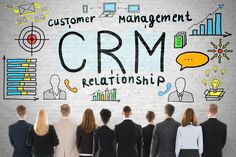As businesses grow, managing customer relationships and internal processes becomes increasingly complex. CRM (Customer Relationship Management) software and ERP (Enterprise Resource Planning) systems play vital roles in helping companies streamline operations, boost efficiency, and enhance customer interactions. The integration of CRM software with ERP systems has become essential for businesses aiming to align sales, marketing, finance, and operations under one seamless platform.
Why Integrate CRM and ERP?
Both CRM and ERP systems offer valuable tools for business management, but they serve different purposes. CRM software primarily focuses on customer interactions, sales, and marketing, while ERP manages the backend operations like supply chain, finance, inventory, and human resources. Integrating these two systems creates a unified platform that allows for better collaboration, data sharing, and operational efficiency across departments.
Key benefits of integrating CRM with ERP include:
- Enhanced Data Flow: Integration enables a smooth exchange of data between customer-facing teams and backend operations. Sales teams can access real-time inventory levels, order history, and payment status, while finance and logistics can view up-to-date customer data for more accurate forecasting and planning.
- Improved Customer Experience: With access to comprehensive customer data from both CRM and ERP systems, companies can provide more personalized and timely service. This holistic view of the customer journey—from lead generation to post-sale support—ensures a consistent experience across all touchpoints.
- Increased Efficiency: Automation between CRM and ERP reduces the need for manual data entry and eliminates data silos. Sales reps can create orders, manage inventory, and check shipment statuses directly within the CRM, while the ERP system handles fulfillment and financial processes. This saves time, minimizes errors, and improves overall productivity.
- Better Sales Forecasting: By integrating sales data from the CRM with financial and inventory information from the ERP, businesses can create more accurate sales forecasts. This alignment helps ensure that inventory levels meet demand, reducing stockouts and overstock situations.
- Streamlined Reporting and Analytics: A combined CRM and ERP system allows for comprehensive reporting, giving businesses a full view of their performance across departments. Executives can generate reports that span sales, finance, customer service, and inventory management, helping them make more informed decisions.
Key Features of CRM Software with ERP Integration
When looking for CRM software that integrates with ERP systems, here are some key features to consider:
- Real-time Data Synchronization: Look for a CRM that offers seamless, real-time data synchronization with your ERP system. This ensures that all information is up-to-date and consistent across departments, preventing discrepancies.
- Customizable Workflows: Integrated systems should allow businesses to create custom workflows that suit their specific processes. For example, automating the transfer of sales orders from CRM to ERP can streamline operations and reduce manual input.
- Scalability: Choose a CRM system that can scale as your business grows. Integration with ERP should remain smooth as more users, products, and customers are added to the platform.
- Data Security: Since both CRM and ERP contain sensitive information, such as customer details and financial data, the integration must provide robust security features to ensure data privacy and compliance with regulations like GDPR or CCPA.
- API and Third-Party Integration: Not all CRM and ERP solutions are from the same vendor. It’s crucial to select a CRM system with open APIs or pre-built connectors that can integrate with your specific ERP system, whether it’s SAP, Oracle, Microsoft Dynamics, or another solution.
Popular CRM Software with ERP Integration
Several CRM solutions on the market offer native or third-party integration with ERP systems. Here are some top options:
- Salesforce: Salesforce offers a wide range of integration capabilities with popular ERP systems like SAP, Oracle, and Microsoft Dynamics. Salesforce’s robust API infrastructure allows businesses to create custom integrations based on their specific needs.
- Zoho CRM: Zoho offers native integration with its own Zoho ERP platform and supports third-party ERP systems. Zoho CRM is ideal for small and mid-sized businesses that need an affordable, customizable solution with strong ERP connectivity.
- Microsoft Dynamics 365: Dynamics 365 is a combined CRM and ERP system, offering a seamless experience for businesses looking for an all-in-one solution. It provides deep integration across sales, marketing, finance, and operations, making it an attractive option for larger organizations.
- SAP CRM: SAP’s CRM solution integrates natively with its ERP system, SAP S/4HANA. This makes it a powerful option for enterprises that already use SAP for their backend operations. It offers a highly integrated experience across customer service, sales, and operations.
- Netsuite CRM: As part of Oracle’s Netsuite ERP platform, Netsuite CRM offers seamless integration with the broader Netsuite ecosystem. This solution is ideal for businesses looking for a comprehensive suite that covers everything from sales and marketing to finance and inventory management.
Challenges in CRM-ERP Integration
While CRM-ERP integration provides significant benefits, there are some challenges to consider:
- Cost: Integrating two major systems can be expensive, especially for small businesses. Implementation, customization, and ongoing maintenance may require a substantial investment.
- Complexity: Depending on the systems in use, integration can be a complex process requiring expert IT support. Ensuring data consistency and avoiding duplication during the integration process can be time-consuming.
- Change Management: Staff will need training to adapt to the new, integrated platform. Without proper onboarding and support, employees may struggle to use the system effectively, reducing the benefits of integration.
Conclusion
Integrating CRM software with ERP systems is a strategic move that helps businesses achieve greater efficiency, improve customer experiences, and streamline operations across departments. By choosing the right CRM solution and addressing potential challenges, companies can enhance their overall performance and maintain a competitive edge in the market.
